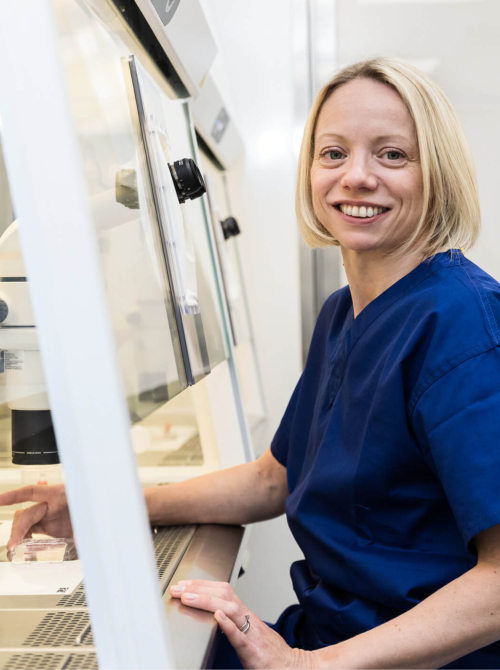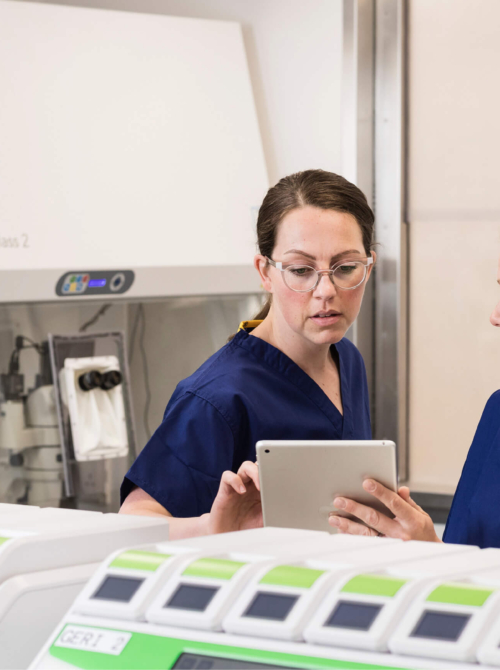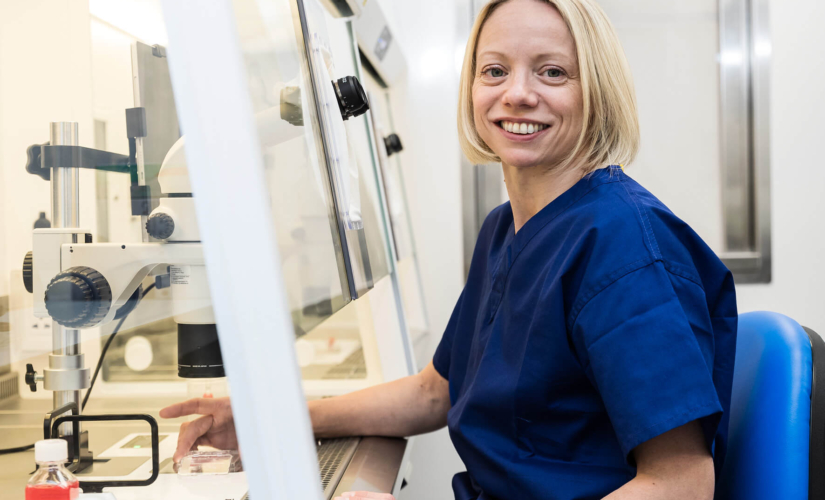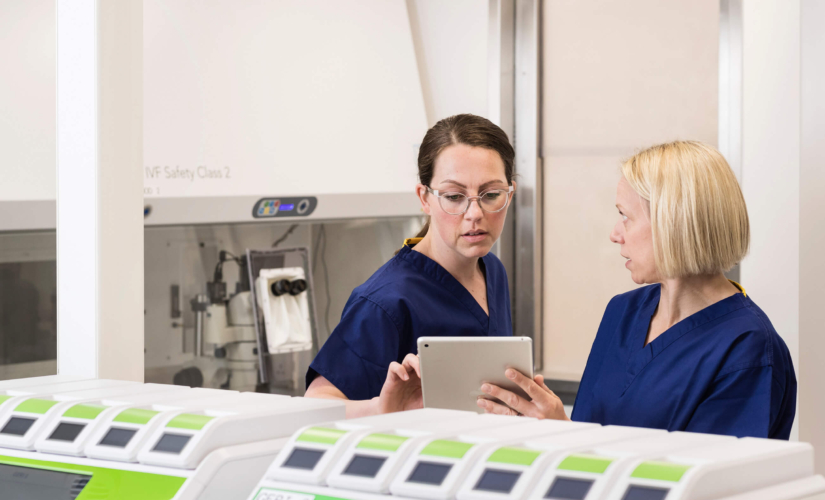The Vital Role of an Embryologist in an IVF Cycle
In the complex and intricate process of IVF, numerous medical professionals play essential roles, but the work of an embryologist is central to the success of an IVF cycle. We ask Emma the Embryologist to explain why.
The Vital Role of an Embryologist in an IVF Cycle
In the complex and intricate process of IVF, numerous medical professionals play essential roles.
Among them, the embryologist holds a particularly critical position, often working behind the scenes to make the dream of parenthood come true for many couples.
Their work is central to the success of an IVF cycle, making them an invaluable part of any reproductive medicine team.
We asked our Director of Embryology and Genetics, Emma Whitney (aka @emmatheembryologist) to help answer a few questions on the role of an embryologist in an IVF cycle and highlight the importance of their work in your treatment plan.
What is an embryologist?
An embryologist is a key player in the field of reproductive medicine, particularly within the realm of assisted reproductive technologies (ART). This specialist role requires extensive training and education, often including a background in biological or health sciences, followed by a master’s degree or PhD in embryology or a related field.
We are responsible for all procedures involving eggs, sperm and embryos in an IVF laboratory, from egg retrieval and fertilisation to embryo development and transfer. And our expertise and precision significantly influence the success of an IVF cycle.
Embryologist’s role in an IVF cycle
The responsibilities of an embryologist during an IVF cycle are multi-faceted and require meticulous attention to detail.
Oocyte (Egg) collection and assessment
While the egg collection procedure is performed by one of our fertility consultants, our embryologists are responsible for examining the aspirated follicular fluid to identify and isolate the eggs safely and get them into the laboratory incubators.
The quality and maturity of these eggs are then assessed, as they significantly impact the chances of successful fertilisation and embryo development.
Sperm preparation
Around the same time, the female is having her eggs collected, a sperm sample is collected from the male partner or we defrost the donor sperm.
After the lab receives the semen sample, the embryologist will first rinse the sample with a special solution. This process, known as sperm washing, removes dead sperm, non-sperm cells, and other debris from the semen.
The sperm are then spun in a centrifuge which separates the healthy, motile sperm from the semen.
Following the washing process, the sperm are then assessed, and the healthiest ones are selected for use in the IVF procedure. There are several methods for selecting the best sperm, including swim-up techniques where the most active sperm swim up into a layer of nutrient media, and density gradient centrifugation, which separates sperm based on their ability to move through a special solution.
Insemination and fertilisation
Once the eggs are retrieved, we then oversee their fertilisation. This can be done through traditional insemination, where the sperm and eggs are simply mixed together and the sperm fertilises the egg naturally (known as IVF), or through Intracytoplasmic Sperm Injection (ICSI), if the sperm count is low or the sperm have difficulty penetrating the egg.
In ICSI, a single healthy sperm is injected directly into each egg. This method is often used when there are concerns about the quantity or quality of the sperm.
The choice between these methods depends on a variety of factors, including sperm quality and previous IVF attempts, and our judgment is vital in making this decision.
Embryo culture and assessment
Post-fertilisation, our embryologists carefully monitor the embryos in time-lapse incubators that mimic the environment of a woman’s body.
During this period, we take a photo every 5 minutes which are all stitched together to create a timelapse video that we use to monitor the growth and development of the embryos, 24 hours a day, evaluating their quality based on several criteria, including cell division rate and morphology.
It’s this crucial phase of close monitoring that can allow us to learn more about your embryos and pick the ones we think will give you the best possible chance of conception. The specifics of the development journey and how long it takes for an embryo to achieve the blastocyst stage is sometimes more important than what it looks like when it gets there.
Any abnormalities at this stage could impact the chances of a successful pregnancy, making the use of time-lapse incubators a really important tool in our lab, as we get to watch how these embryos are developing, informing us
Monitoring embryo development
The use of time-lapse incubators in IVF has revolutionised the way we embryologists can monitor embryo development.
These incubators are used as standard in the labs at The Evewell, and they not only keep your embryos at the same temperature as your body, but they also minimise disturbances to the embryo’s environment, as there’s no need to remove the embryos from the incubator for assessment.
Secondly, it provides much more information than traditional methods. Instead of getting a snapshot of the embryo’s development at a single point in time, we can now observe the dynamic process of cell division and growth in real-time.
This wealth of information helps us identify embryos with the best potential for successful implantation. For instance, research suggests that the timing of certain developmental milestones, such as the first cell division or the transition to the blastocyst stage, can provide clues about an embryo’s viability.
Grading the embryos
Embryo grading is essentially a language that we use to describe an embryo’s quality. It involves assessing the number, size, and shape of cells, the amount of fragmentation, and the development of the inner cell mass and trophectoderm (future placenta) in the blastocyst stage.
However, it’s important to understand that embryo grading is not an exact science. It’s a tool to help us make the best decision about which embryos to transfer, but it doesn’t predict with 100% accuracy which embryos will lead to a successful pregnancy. For instance, even an embryo graded as “poor quality” could still result in a healthy baby, while a “high-quality” embryo might not implant.
Furthermore, the grading system can vary between different clinics, so a grade given at one clinic might not be directly comparable to a grade given at another.
It’s also worth noting that embryo grading is just one piece of the puzzle. Other factors, such as the developmental stages of the embryo, the woman’s age, her overall health, and the quality of her eggs, can also significantly impact IVF success rates.
Embryo transfer
Once the embryos reach a certain stage of blastocyst development (usually after three to five days), we then select the best quality embryo, taking many, many factors into consideration and not just the grade.
The embryologist loads the embryos into a thin tube called a catheter, which is passed through the woman’s cervix and into her uterus. If an embryo successfully implants in the uterus lining, pregnancy will occur.
Cryopreservation
Any good quality embryos that aren’t transferred can be frozen for future use; a process known as cryopreservation.
Our team is responsible for this delicate process, ensuring the embryos are safely preserved.
The embryologist first selects the embryos to be frozen and places them in a solution containing cryoprotectants. Cryoprotectants are substances that help protect the embryos from damage caused by ice crystal formation during freezing.
The embryos are then cooled to sub-zero temperatures, using a method called “vitrification”, which involves cooling the embryos at an extremely fast rate.
This rapid cooling process turns the liquid inside the cells into a glass-like solid, preventing damaging ice crystals from forming. Vitrification has become the preferred method in many labs because it results in higher survival rates for the embryos (and eggs, in an egg freezing cycle).
Once the embryos are frozen, they are stored in liquid nitrogen tanks at a temperature of -196 degrees Celsius. They can remain in storage for up many years without significant degradation, and in the UK you will need to use your embryos within 55 years.
A key role in IVF
The role of an embryologist in an IVF cycle extends far beyond the laboratory. Our team’s expertise, precision, and dedication play a significant part in the journey towards parenthood for couples undergoing IVF.
From the initial stages of egg and sperm preparation to the final steps of embryo transfer and cryopreservation, embryologists work tirelessly behind the scenes, playing a vital role in bringing life into the world.
Unique to The Evewell is that every single patient will receive an embryologist consultation before commencing treatment, helping you make decisions and plans that will affect your family-building plan today and in the future.
Note: This blog post is for informational purposes only and should not be considered medical advice. For personalised guidance, please consult with a doctor.






